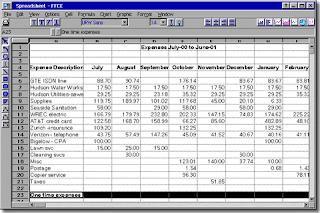
From my earlier post, you know that Manually Entered SpreadSheets ("M.E.S.S.") are my nemesis. Not only are they time consuming to create and maintain, but they are also difficult to audit. As anyone who has been through a Sarbanes-Oxley (Bill 198) review knows, spreadsheets represent a significant control risk because of how easily errors can be introduced without detection. For example:
At this point you should ensure that there are the appropriate backup procedures for the spreadsheet. Ideally you will have documentation to support the spreadsheet as well. Then on an annual or biannual basis spreadsheets should be revisited, comparisons run on the tested versions and the audit trail reviewed to ensure that it is still functioning as required. Needless to say, any significant changes made to the model should be carefully considered, documented and re-tested at the time the changes are made.In short, spreadsheets need to be considered as a separate financial computer system and all the controls associated with a financial system need to be applied to the extent the spreadsheet is to be relied upon for financial reporting. All of a sudden your "simple" spreadsheet is expensive to audit!
Currently I am working on a project to eliminate financial spreadsheets for an international client. Significant areas include:
- Multilevel consolidations,
- Canadian & US GAAP adjustments, and
- Tax valuations.









